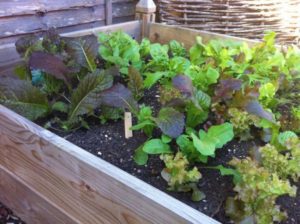Cool Season Crops for Vegetable Gardens
go.ncsu.edu/readext?638004
en Español / em Português
El inglés es el idioma de control de esta página. En la medida en que haya algún conflicto entre la traducción al inglés y la traducción, el inglés prevalece.
Al hacer clic en el enlace de traducción se activa un servicio de traducción gratuito para convertir la página al español. Al igual que con cualquier traducción por Internet, la conversión no es sensible al contexto y puede que no traduzca el texto en su significado original. NC State Extension no garantiza la exactitud del texto traducido. Por favor, tenga en cuenta que algunas aplicaciones y/o servicios pueden no funcionar como se espera cuando se traducen.
Português
Inglês é o idioma de controle desta página. Na medida que haja algum conflito entre o texto original em Inglês e a tradução, o Inglês prevalece.
Ao clicar no link de tradução, um serviço gratuito de tradução será ativado para converter a página para o Português. Como em qualquer tradução pela internet, a conversão não é sensivel ao contexto e pode não ocorrer a tradução para o significado orginal. O serviço de Extensão da Carolina do Norte (NC State Extension) não garante a exatidão do texto traduzido. Por favor, observe que algumas funções ou serviços podem não funcionar como esperado após a tradução.
English
English is the controlling language of this page. To the extent there is any conflict between the English text and the translation, English controls.
Clicking on the translation link activates a free translation service to convert the page to Spanish. As with any Internet translation, the conversion is not context-sensitive and may not translate the text to its original meaning. NC State Extension does not guarantee the accuracy of the translated text. Please note that some applications and/or services may not function as expected when translated.
Collapse ▲Extension Gardener Webinar
8/12/21 5:30-7:30 p.m.
Vegetable crops are classified as either ‘warm-season’ or ‘cool-season’ according to their optimum planting time. Cool-season crops are generally planted in early fall to early spring because they do not tolerate the heat stress of the summer. However, cool-season crops vary in the specific horticultural practices needed for optimum production.
Join Matt Jones (Extension Horticulture Agent) and the Master Gardener℠ volunteers of Chatham County for a webinar targeting home and community gardeners on how to grow cool-season vegetables. Participants will learn about planting techniques and timing, best varieties, common problems, and harvesting methods for broccoli, cabbages, carrots. kales, lettuces, onions, peas, potatoes, and asparagus.
Registration is free. To register on Eventbrite, CLICK HERE.
This webinar is part of the Extension Gardener series that is open to everyone. This webinar can also serve as one of six prerequisites needed to be part of the Extension Master Gardener℠ Core Training and Volunteer Program. Learn more about becoming a Master Gardener volunteer in Chatham County.
The Volunteer Core Training was delayed in 2020 due to COVID. The rescheduled training date is to be determined. Contact Matt Jones if you wish to be notified of the next round of Volunteer Core Training or have questions about the program.
QUESTIONS? Contact N.C. Cooperative Extension, Chatham County Center by calling 919-542-8243 or email matt_jones@ncsu.edu
Persons with disabilities and persons with limited English proficiency may request accommodations to participate by contacting Ginger Cunningham, County Extension Director, at 919.542.8202, ginger_cunningham@ncsu.edu, or in person at the County Extension Office at least 30 days prior to the event.





